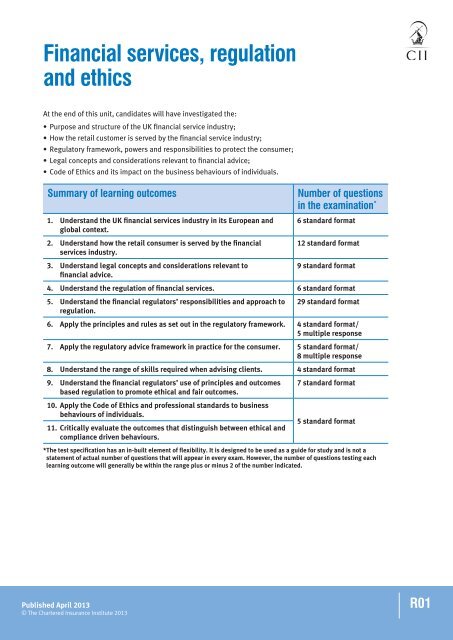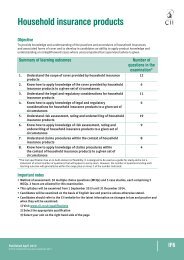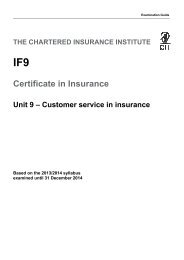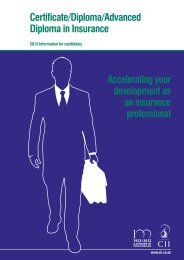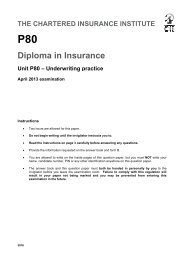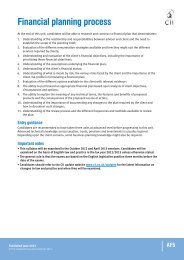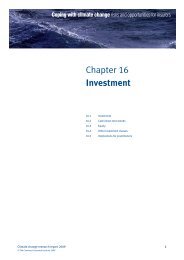R01 2013-2014 Syllabus - The Chartered Insurance Institute
R01 2013-2014 Syllabus - The Chartered Insurance Institute
R01 2013-2014 Syllabus - The Chartered Insurance Institute
You also want an ePaper? Increase the reach of your titles
YUMPU automatically turns print PDFs into web optimized ePapers that Google loves.
Financial services, regulationand ethicsAt the end of this unit, candidates will have investigated the:• Purpose and structure of the UK financial service industry;• How the retail customer is served by the financial service industry;• Regulatory framework, powers and responsibilities to protect the consumer;• Legal concepts and considerations relevant to financial advice;• Code of Ethics and its impact on the business behaviours of individuals.Summary of learning outcomes1. Understand the UK financial services industry in its European andglobal context.2. Understand how the retail consumer is served by the financialservices industry.3. Understand legal concepts and considerations relevant tofinancial advice.Number of questionsin the examination *6 standard format12 standard format9 standard format4. Understand the regulation of financial services. 6 standard format5. Understand the financial regulators’ responsibilities and approach toregulation.29 standard format6. Apply the principles and rules as set out in the regulatory framework. 4 standard format/5 multiple response7. Apply the regulatory advice framework in practice for the consumer. 5 standard format/8 multiple response8. Understand the range of skills required when advising clients. 4 standard format9. Understand the financial regulators’ use of principles and outcomesbased regulation to promote ethical and fair outcomes.10. Apply the Code of Ethics and professional standards to businessbehaviours of individuals.11. Critically evaluate the outcomes that distinguish between ethical andcompliance driven behaviours.7 standard format5 standard format*<strong>The</strong> test specification has an in-built element of flexibility. It is designed to be used as a guide for study and is not astatement of actual number of questions that will appear in every exam. However, the number of questions testing eachlearning outcome will generally be within the range plus or minus 2 of the number indicated.Published April <strong>2013</strong>© <strong>The</strong> <strong>Chartered</strong> <strong>Insurance</strong> <strong>Institute</strong> <strong>2013</strong><strong>R01</strong>
Important notes• Method of assessment: 100 questions: 87 standard format and 13 multiple response questions. 2 hoursare allowed for this examination.• This syllabus will be examined from 1 September <strong>2013</strong> to 31 August <strong>2014</strong>.• Candidates will be examined on the basis of English law and practice in the tax year <strong>2013</strong>/<strong>2014</strong> unlessotherwise stated.• It should be assumed that all individuals are domiciled and resident in the UK unless otherwise stated.• Candidates should refer to the CII website for the latest information on changes to law and practice andwhen they will be examined:1) Visit www.cii.co.uk/qualifications2) Select the appropriate qualification3) Select your unit on the right hand side of the pagePublished April <strong>2013</strong> 2 of 4© <strong>The</strong> <strong>Chartered</strong> <strong>Insurance</strong> <strong>Institute</strong> <strong>2013</strong>
1. Understand the UK financial servicesindustry in its European and globalcontext.1.1. Describe the role, structure and context of theUK financial services market and internationalmarkets.1.2. Explain the function and operation of financialservices within the economy.1.3. Describe the role and impact of government andthe impact of the EU on UK regulation.2. Understand how the retail consumeris served by the financial servicesindustry.2.1. Explain the obligations that the financial servicesindustry has towards consumers.2.2. Explain consumers’ main financial needs and howthese may be prioritised and met.3. Understand legal concepts andconsiderations relevant to financialadvice.3.1. Explain the concepts of legal persons, powerof attorney, law of contract and agency, andownership of property.3.2. Explain relevant laws governing insolvency andbankruptcy.3.3. Explain relevant laws governing wills, intestacyand trusts.4. Understand the regulation of financialservices.4.1. Examine the roles of the PRA, FCA, HM Treasuryand the Bank of England in regulating the market.4.2. Examine the role of other regulatory bodies andsources of additional oversight.4.3. Examine the statutory framework of regulation,including the role of EU regulation and keydirectives.5. Understand the financial regulators’responsibilities and approach toregulation.5.1. Explain the financial regulators’ statutoryobjectives and how they are structured to achievethese objectives.5.2. Explain the main principles and rules in the PRAand FCA handbooks.5.3. Explain the approach to risk based supervision,discipline and enforcement, and sanctions to dealwith criminal activities.6. Apply the principles and rules as setout in the regulatory framework.6.1. Apply the FCA’s and PRA’s regulatory principlesand rules.6.2. Apply current anti-money laundering, proceeds ofcrime, and data protection obligations.6.3. Apply the rules of relevant dispute resolution andcompensation schemes.7. Apply the regulatory framework inpractice for the consumer.7.1. Apply client relationships, regulated advicestandards, and the adviser responsibilities interms of these.7.2. Monitor and review client plans and circumstances.8. Understand the range of skills requiredwhen advising clients.8.1. Examine the range of skills required when advisingclients.9. Understand the financial regulators’use of principles and outcomes basedregulation to promote ethical and fairoutcomes.9.1. Examine the Principles for Businesses and thediscretionary obligations these place on firms.9.2. Examine the impact of corporate culture andleadership.9.3. Examine the responsibilities of approved personsand the need for integrity, competence and fairoutcomes for clients.10. Apply the Code of Ethics andprofessional standards to businessbehaviours of individuals.10.1. Apply the Code of Ethics and the professionalprinciples and values on which the code is based.10.2. Identify ethical dilemmas and apply the stepsinvolved in managing ethical dilemmas.11. Critically evaluate the outcomesthat distinguish between ethical andcompliance driven behaviours.11.1. Evaluate the positive indicators of ethicalbehaviour.11.2. Evaluate the negative indicators of limitingbehaviour to compliance within the rules.11.3. Critically evaluate the outcomes that distinguishethical and compliant behaviours.Published April <strong>2013</strong> 3 of 4© <strong>The</strong> <strong>Chartered</strong> <strong>Insurance</strong> <strong>Institute</strong> <strong>2013</strong>
<strong>Syllabus</strong> construction<strong>The</strong> syllabus consists of learning outcomes andassessment criteria only. A comprehensive listing of theindicative content is located at www.fsa.gov.uk/static/pubs/other/exam_stnds/rdr%20core%20standards%20financial%20services%20regulation%20and%20ethics.pdf.Reading list<strong>The</strong> following list provides details of various publicationswhich may assist with your studies.Note: <strong>The</strong> examination will test the syllabus alone. <strong>The</strong>reading list is provided for guidance only and is not initself the subject of the examination. <strong>The</strong> publications willhelp candidates keep up-to-date with developments andwill provide a wider coverage of syllabus topics.CII/Personal Finance Society members can borrow mostof the additional study materials below from KnowledgeServices.CII study texts can be consulted from within the library.For further information on the lending service, please goto www.cii.co.uk/knowledge.CII study textFinancial services, regulation and ethics. London: CII. Studytext <strong>R01</strong>.Additional readingAdditional reading materials are available through thelibrary or on the Knowledge Services website.New materials are added frequently – for information aboutnew books and articles in your area of interest, please visitwww.cii.co.uk/knowledge or email knowledge@cii.co.uk.Books (and ebooks)<strong>The</strong> process of financial planning. Chris Gilchrist. <strong>The</strong>adviser’s guide series. Annual. (London, Taxbriefs).Business ethics and values: individual, corporateand international perspectives. Colin Fisher and AlanLovell. FT Prentice Hall, 2006. Also available online atwww.cii.co.uk/knowledge (CII/Personal Finance Societymembers only).Winning client trust. Chris Davies. London: Ecademy Press,2011.Factfiles and other online resources<strong>The</strong> regulation of retail investment business. Kevin Morrisand Tony Wiltshire. Updated as necessary. Available onlinevia www.cii.co.uk/knowledge (CII/Personal Finance Societymembers only).<strong>The</strong> regulatory framework. Simon Collins. Updated asnecessary. Available online via www.cii.co.uk/knowledge(CII/Personal Finance Society members only).<strong>The</strong> regulation of insurance intermediaries. Ian Youngman(based on an earlier factfile by Tony Wiltshire). London:CII Knowledge Services. Updated as necessary. Availableonline via www.cii.co.uk/knowledge (CII/Personal FinanceSociety members only).<strong>The</strong> regulation of mortgage intermediaries. Brad Baker andTony Wiltshire. London: CII Knowledge Services. Updated asnecessary. Available online via www.cii.co.uk/knowledge(CII/Personal Finance Society members only).<strong>The</strong> regulation of investment intermediaries. Kevin Morrisand Tony Wiltshire. London: CII Knowledge Services.Updated as necessary. Available online viawww.cii.co.uk/knowledge (CII/Personal Finance Societymembers only).<strong>The</strong> EU single market. <strong>The</strong> European Commission.Updated as necessary. Available online athttp://ec.europa.eu/internal_market/finances/index_en.htmFurther articles and technical bulletins are available atwww.cii.co.uk/knowledge (CII and Personal Finance Societymembers only).Journals and magazinesFinancial solutions. London: CII. Six issues a year. Alsoavailable via www.cii.co.uk/knowledge (CII/PersonalFinance Society members only).Reference materialsDictionary of insurance. C Bennett. 2nd ed. London:Pearson Education, 2004. Also available as an ebook viawww.cii.co.uk/knowledge (CII/Personal Finance Societymembers only).Lamont’s glossary: the definitive plain English moneyand investment dictionary. Barclay W Lamont. 10thed. London: Taxbriefs, 2009. Also available online atwww.cii.co.uk/knowledge (CII/Personal Finance Societymembers only).Dictionary of banking and finance. P H Collin.A&C Black, 2005. Also available as an ebook viawww.cii.co.uk/knowledge (CII/Personal Finance Societymembers only).Harriman’s financial dictionary: over 2,600 essentialfinancial terms. Edited by Simon Briscoe and Jane Fuller.Harriman House, 2007. Also available as an ebook viawww.cii.co.uk/knowledge (CII/Personal Finance Societymembers only).<strong>The</strong> professional adviser’s factfile. Taxbriefs. London:Taxbriefs. Looseleaf.<strong>The</strong> Financial Conduct Handbook and Prudential Handbook,London: Financial Conduct Authority and PrudentialRegulatory Authority respectively. Both available online atwww.fshandbook.info/FS/.Examination guideAn examination guide, which includes a specimen paper, isavailable to purchase via www.cii.co.uk.If you have a current study text enrolment the specimenpaper is included, as a mock test, via Revisionmate(www.revisionmate.com). Details on how to access thisresource are on the first page of the study text.Exam technique/study skills<strong>The</strong>re are many modestly priced guides available inbookshops. You should choose one which suits yourrequirements.Published April <strong>2013</strong> 4 of 4© <strong>The</strong> <strong>Chartered</strong> <strong>Insurance</strong> <strong>Institute</strong> <strong>2013</strong>


